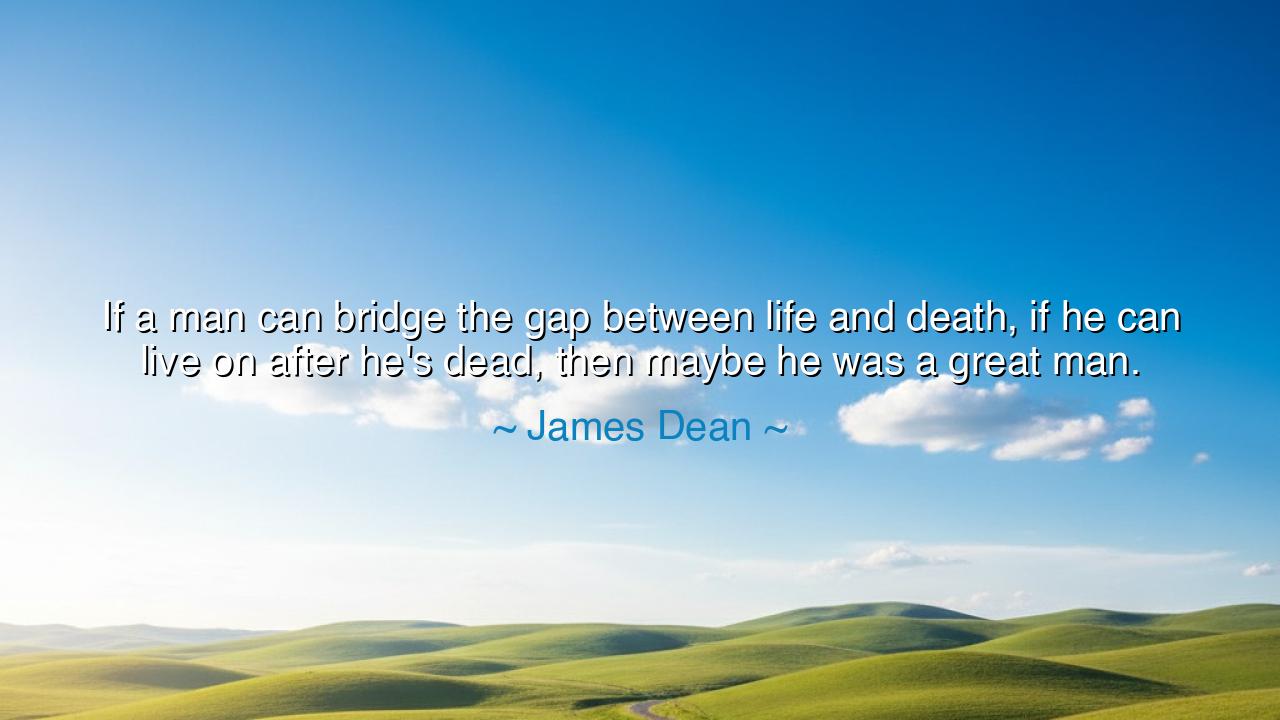
If a man can bridge the gap between life and death, if he can
If a man can bridge the gap between life and death, if he can live on after he's dead, then maybe he was a great man.






In the words of James Dean, “If a man can bridge the gap between life and death, if he can live on after he’s dead, then maybe he was a great man.” These words, spoken by one whose own life burned bright and brief, shimmer with both prophecy and paradox. For Dean, who perished at only twenty-four, did indeed bridge that gap — his image, his voice, his restless spirit enduring far beyond the grave. Yet his quote reaches beyond the self; it touches the deepest yearning of humankind: to endure, to leave behind something that defies time, to live on not in body but in memory.
To bridge the gap between life and death is no ordinary feat. It is not achieved through wealth, nor power, nor fleeting fame. It is a sacred triumph of the soul — the creation of something so pure, so true, that it continues to breathe even when the creator is gone. James Dean, the rebel who captured the sorrow and fire of youth, understood this instinctively. He lived not as one obsessed with longevity, but as one devoted to authenticity, to burning completely in the short time allotted to him. His quote reveals a man who recognized that immortality belongs not to those who live long, but to those who live deeply.
History offers many who have achieved this transcendence. Consider Alexander the Great, who conquered worlds before thirty and yet lives in every page of history; or Leonardo da Vinci, whose hands stopped centuries ago, yet whose vision still shapes our imagination. But not all greatness is born of conquest or invention. The humble too have bridged this gap — the mother whose kindness lives on in her children, the teacher whose wisdom ripples through generations, the poet whose words console strangers long after their pen has fallen still. In them all, death becomes not an end but a transformation.
The ancients, too, knew this truth. The Greeks spoke of kleos, the glory that endures after death — the echo of deeds sung by future generations. Achilles, though fated to die young, chose a short life filled with immortal purpose over a long life of obscurity. In the same spirit, Dean’s words remind us that to live fully and truly, one must accept mortality and yet strive to transcend it through meaning. The body perishes, but the essence — the courage, the art, the love one leaves behind — becomes the bridge across eternity.
But there is another, gentler meaning in Dean’s reflection. To live on after one’s death is not merely to be remembered by the world, but to continue shaping hearts unseen. Every act of goodness, every moment of truth, every spark of inspiration passed from one soul to another — these form the living architecture of immortality. The man who gives hope to others, who awakens beauty or compassion in them, continues to live in the unseen currents of human spirit. Death may claim his body, but never his influence.
The lesson here is both humbling and empowering: your life is your message to the future. You need not conquer kingdoms or carve monuments of stone. What matters is the legacy of your spirit — the kindness you show, the truth you defend, the love you leave behind. Live in such a way that when you are gone, something of you remains in the laughter, courage, and dreams of others. That is what it means to bridge the gap between life and death.
So, children of the present age, take heed of this ancient wisdom reborn through James Dean’s words: live as if your days were numbered, but love as if they were endless. Pour your whole being into what you create, whom you cherish, and what you believe. Do not chase immortality; embody it. For the great man or woman is not one who refuses to die, but one whose spirit refuses to be forgotten.
Thus, the restless youth who lived fast and fell early left behind not just an image, but a truth — that to live greatly is to live intensely, and to die leaving light enough to guide those who follow. The bridge between life and death is built not of years, but of meaning — and those who build it stand eternal.






AAdministratorAdministrator
Welcome, honored guests. Please leave a comment, we will respond soon